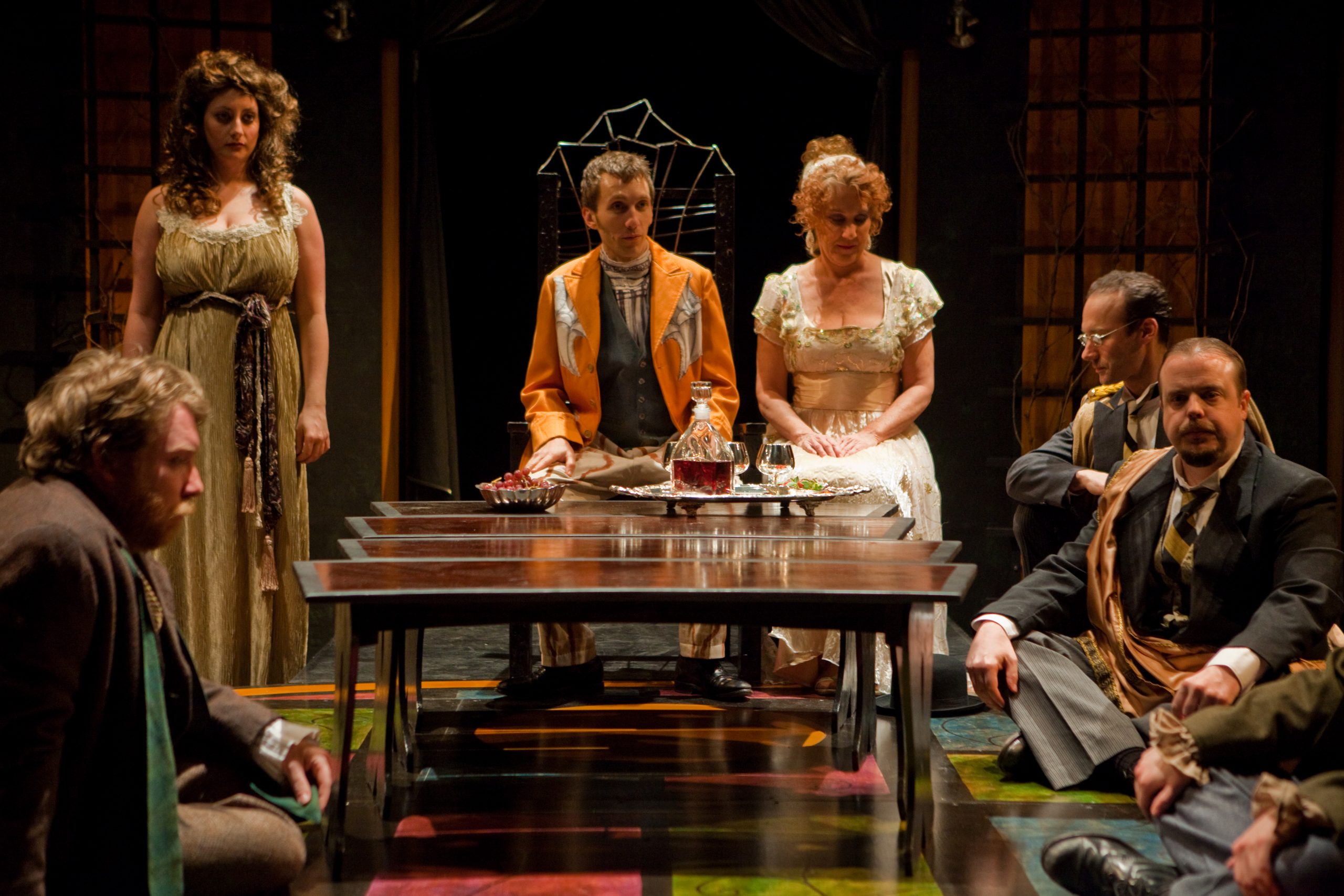written by Albert Camus, adapted by David Greig
directed by Amy Rummenie
February 13 – 28, 2009
Red Eye Theater
A young and heartbroken Roman Emperor holds dominion over the known world. Using vicious logic and deliberate cruelty, he tests the limits of absolute power. Has he really found the impossible: the meaning of life? This play by renowned French philosopher and Nobel winner Albert Camus is given a lush new translation by British playwright David Greig.
Cast
Production Team
| caligula | Dave Gangler | director | Amy Rummenie |
| helicon | Charles Hubbell | set | Steve Kath |
| caesonia | Ellen Karsten | costumes | Kathy Kohl |
| cherea | Sam Landman | lighting | Peter Mitchell |
| scipio | Sid Solomon | sound | Montana Johnson |
| metellus | Peter Ooley | props | Jenna Papke |
| octavius | Larry J. Evans | stage manager | Sarah Holmberg |
| cassius | Ed Williams, Jr. | dramaturg | Leslie Koppenhaver |
| mereia | Matthew Glover | assistant director | Katie Willer |
| lepidus | Shad Cooper | fight choreographer | Luis Rosa |
| mucius | Joe Wiener | sound board operator | Ben Egerman |
| mucius’ wife | Jennifer Phillips | production images | Dan Norman |
| soldier/poet | Justin Alexander | ||
| soldier/poet | Russell O’Connell |
Reviews
Walking Shadow Theatre Company’s production of Caligula at Red Eye Theater, directed by Amy Rummenie and starring Dave Gangler, is splendid. The script—translated, from the French, by British author David Greig—is surprisingly economic, given European existentialists’ penchant for interminable contemplation of the mundane. Greig’s dialogue is so tight that one can overlook his one or twice lapsing into contemporary colloquialism for this period piece. Ultimately, he brings the story home.
Amy Rummenie (Amazons and Their Men, The American Pilot), Walking Shadow founding member and co-artistic-director, makes a hard job look easy. Guiding a 14-member cast through a roughly two-hour production, keeping the pace brisk and eliciting sterling turns from her principal actors, Rummenie wields the sort of mastery for which such celebrated names as Bain Boehlke, Lynn Musgrave, and Lou Bellamy are known. She mines each moment for all it is worth; the small details amount to a strong overall vision.
It doesn’t hurt, of course, to have Dave Gangler in the lead. The prospect of portraying Caligula is fraught with temptations to ham it up. Gangler, accomplished on stage, television, and in film, handily avoids stepping into that trap. Brilliantly understated, he brings range and subtlety to bear, pulling off a complex portrayal—both protagonist and self-defeating antagonist—with rich presence and compelling immediacy.
-Dwight Hobbes, TC Daily Planet
Walking Shadow Theatre Company tackles this story in its latest production, a new adaptation by David Greig of Albert Camus’ pre-World-War-II play. No matter the age of the material, or of the version, the story still resonates, says Director Amy Rummenie.
“At its core, ‘Caligula’ is about the dangers of philosophical absolutism in all its forms; from religious intolerance to black and white political stances. Caligula is a leader who takes a bold philosophical argument and pushes it to logical extremes,” she says. “In return, we see the impact on his subordinates — he tests the limits of their endurance and we get a terrifying sense of how far a charismatic leader can veer off course before the populace has the courage to strike back.”
Like any dramatist, Camus adds his own layers to the story. Camus’ portrait of Caligula draws from a variety of historical sources, each one of its own dubious accuracy. As with any history told by the victor, the information that survives about Caligula “is tinged with the desires of the writer,” Rummenie says. “Camus has picked details from these sensational stories and adapted them to suit his philosophical argument.
Because this play was written on the cusp of WWII and first performed in 1945, there has always been speculation that it speaks on the dangers of the Nazis and their ilk, but Camus asserted that it was first and foremost a ‘tragedy of the intelligence.’ “
David Gangler, in the title role, spent considerable time and research trying to get under the skin of Caligula the character, and the existentialist Camus’ approach to the story.
“In the end, I don’t think Camus is advocating that people should go out and follow Caligula’s lead,” Gangler says. “I think the point of Caligula in this play is to give the audience a window into the notion that life has no meaning. … I think Camus presents a thesis and then attacks the thesis with other characters later on, so that in the end the audience will leave thinking for themselves about whether life has any intrinsic meaning or whether they create their own meaning in life.”
Rummenie sees the message in a similar way. “As it asks what it is to be alive and aware of the universe, the play investigates the idea that life is too precious to be wasted on the superficialities of social pecking order and blind habit, with all meaning solely created by our own desires,” she says.
– Ed Huyck, MinnPost

